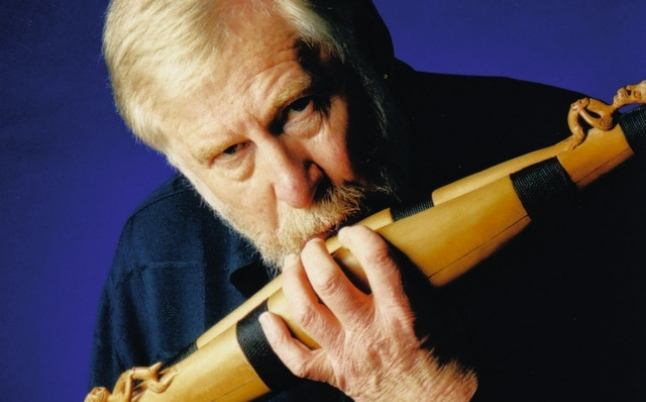Kua hinga te tōtara o te wao nui a Tāne
As a trumpet and flute player from a jazz and brass band background, and a teacher with an enquiring mind and thirst for te ao Māori, Richard Nunns had the ideal skills to complement those of Brian Flintoff, an inspired master carver, and the late Hirini Melbourne, composer, singer, fluent speaker of te reo and holder of knowledge of his Tuhoe and Ngati Kahungunu heritage. Those three men together formed the nucleus of Haumanu (the breath of birds) which initiated the renaissance of taonga pūoro in Aotearoa, beginning in the 1970s, at which stage the prevailing theory was that the voices of the taonga were, in the words of Te Rangi Hiroa, ‘forever mute’. Together they travelled the country, taking the taonga back to the iwi, and gathering further fragments of memory related to the instruments to inform their own work.
Richard, your journey with the taonga pūoro changed your life. It changed my life, and the lives of many others. You have achieved so much more than you ever thought you could. Look at your legacy. The increasing knowledge and performance skills of traditional instruments by iwi throughout Aotearoa. Your patience and generosity through listening, encouraging, sharing, teaching and mentoring players in particular, but also students writing theses, or composers wanting to incorporate the sounds into new works. Your reverence for the taonga. Your joy in travelling the world to share the sounds. The taonga pūoro workshops bringing makers, players, composers and classical performers together.
Once, ages ago, you asked me how I felt writing a piece that would probably never get another performance because there was no-one else capable of performing it. I said that that didn’t matter because I’d heard the piece and it worked. But today the taonga are heard everywhere; they are used in healing, in ritual, in kapa haka, in concert halls around the world. There are new generations of makers, and outstanding players, of researchers.
Your musicianship was impeccable. An instinctive improvising musician, although you could read music, you found a written score a barrier to spontaneity. You enriched the lives of so many classical musicians. And no taonga pūoro player yet has quite achieved the wairua that always shines through your playing.
Travel well, e hoa, and be at peace now.
They told me, Heraclitus, they told me you were dead;
They brought me bitter news to hear, and bitter tears to shed.
I wept as I remembered how often you and I
Had tired the sun with talking, and sent him down the sky.
And now that thou art lying, my dear old Carian guest,
A handful of grey ashes, long ago at rest,
Still art thy pleasant voices, thy nightingales, awake,
For death, he taketh all away, but these he cannot take.
William Cory (1823-92)
